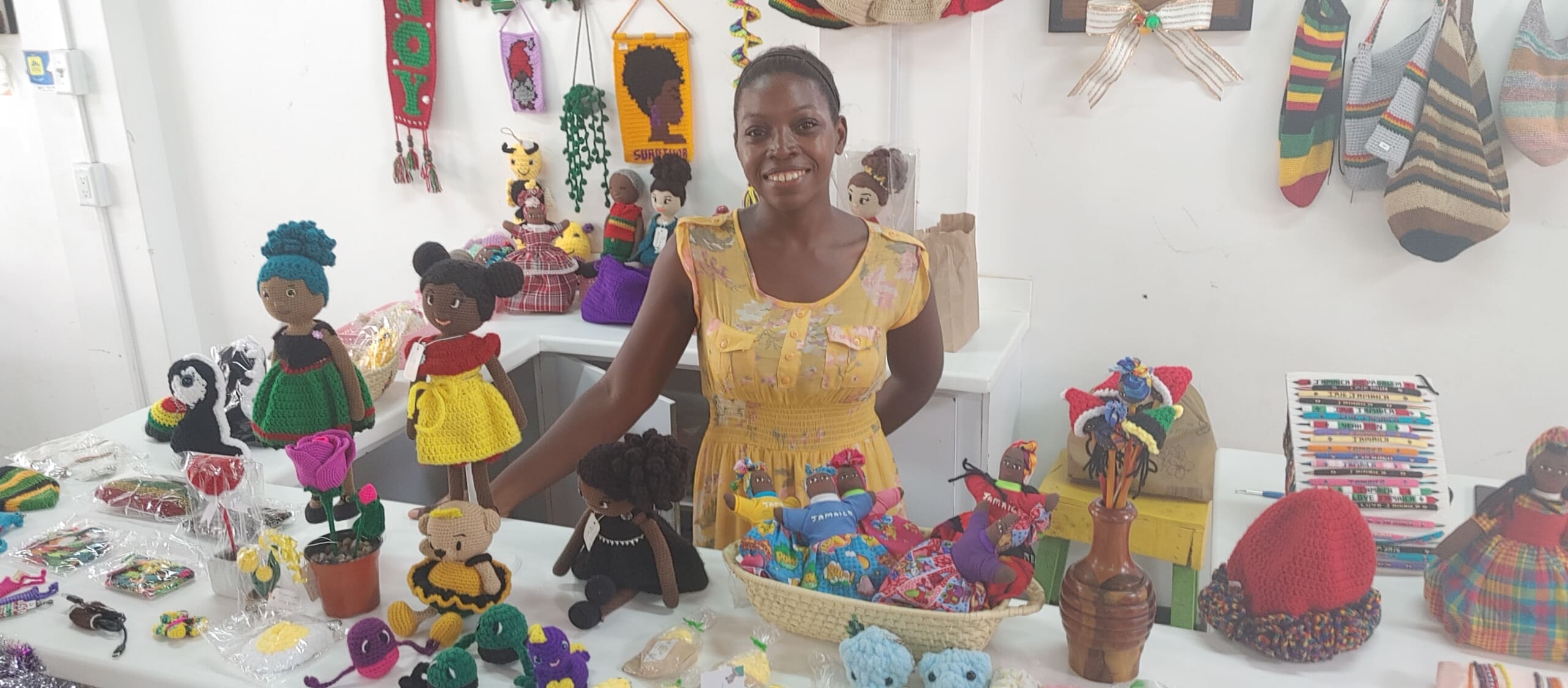Crocheted items can help support survivors of domestic violence
Cruise ship passengers visiting the Artisan Village in Falmouth, Jamaica, have a chance to return home with some crocheted critters and other yarn creations, and lend a helping hand to local women who have at times been in need of a helping hand at the same time.
Loi-Renee Letts is the owner of Moni’s Voice, which is among the many artisan businesses found at the shoreside market, and which offers carefully created crocheted animals, flowers and other items to those eager to bring Jamaican souvenirs home after visiting the tropical island.
But Letts is eager to let those visitors know that there is a poignant side to her work as well.
“I had been interested in crocheting while I was pregnant but my partner at the time convinced me I’d be no good at it so I never learned. After leaving and needing an outlet for my anxiety and depression, I taught myself to crochet using YouTube videos,” says Letts, who reports that she was in an abusive relationship for years and then suddenly found herself on her own with a young child and no means of support after leaving her partner.
“I hadn’t done crocheting before but I had done other fiber arts, including sewing and embroidering. I chose crocheting at the time because my baby needed items I couldn’t afford. The crochet blankets and clothing I saw online were beautiful and I wanted her to have that too. The first thing I learned to make was a beanie. It took several tries, but I figured out how to make one that she could actually wear. I was really proud of it and showed it off.”
The creation of the hat was followed by requests for crocheted bags and other items, enabling her business to gain steam.
“It is (now) my sole source of income,” Letts continues. “I turned my love for crocheting into a business because I wanted to raise money to give back to social support groups and charities. However, as a single mother, it hasn’t been as easy and I am yet to realize that goal. Instead, I have volunteered my time and knowledge to speak on forums, retreats, and in other gatherings so others can benefit.
“Running my own handmade business, managing a home, healing, and raising a child on my own is stressful. Crocheting is an affordable, relaxing way to ease the stress,” says Letts, who is upfront with visiting tourists about having been a domestic violence victim who hit “rock bottom,” after having left her partner and having had no income and being unable to find work.

Letts now helps other women in similar situations learn to crochet, enabling them to earn extra money. The number of women working with her varies, and they’re able to help her with inventory and earn at the same time.
Letts reports her newly found skill helps her and her colleagues cope with a past that was at times troubled.
“We do find crocheting very therapeutic,” she says. “The repetitive action of crocheting is very relaxing and has been proven to reduce stress and even help with insomnia. Crocheting together creates a safe, relaxing environment where we can share our domestic violence experiences or mental health struggles and get support.
“I create crochet jewelry such as earrings, bracelets, and necklaces,” she continues. “I also make wall-hangings, flowers, and other plants that serve as decor statement pieces. My favourite, and most popular creations though are my amigurumi. I make many different animals and toys with a Jamaican flair. You’ll see this in my bestselling crochet turtle that has the Jamaican flag on its shell. And a crowd favourite, my dolls that have a range of skin tones and hairstyles to represent our local children. Even the dolls’ names are popular nicknames for our children.”
Among carefully woven items recently available on the Moni’s Voice website were a smiling, colorful Tyrannosaurus Rex billed as “perfect for all dino fans” and such flowers as roses, hibiscuses and poinsettias.
Moni’s Voice — the name of which is derived from her middle name Monique — has grown to the point where it now gets purchase requests from North America and Europe.
Letts says domestic violence is a widespread problem in Jamaica. “Unfortunately, the belief of many is “See and blind. Hear and deaf.” Or in other words, ignore what is all around us. There is a lot of victim-blaming, which discourages victims from speaking up and seeking help. Thankfully, our police force has heard the cries. And while they still have a long way to go, there is an arm of the Jamaica Constabulary Force that focuses on tackling domestic violence. They host workshops and even do informational pop-ups in towns all over the island to spread awareness.
“I am working to create an online forum where victims and survivors can have our own virtual community. I’ve been told there are other such groups on the island. Mainly operating through various legal, religious, and social support groups. These are important, but not many men and women know of the resources available.”
Letts doesn’t hide her own history of having an abusive partner when meeting tourists visiting her stand.
“I’m very open about my experience and I’m always willing to answer questions about it,” Letts adds. “The information I’ve shared has helped so many, that I feel I must continue to give back. I usually only introduce what my business is about, giving hope to women and children affected by domestic violence.
“If guests are interested in learning more, I’m always willing to share.”
Meanwhile, Letts encourages others to explore what she labels the therapeutic effects of arts, including those having to cope with an abusive partner.
“It’s a great addition to talk and medicinal therapy. There’s an artist in all of us, whether your art is crocheting, sewing, painting, carving or photography,” she continues. “And for those men and women who are yet to escape their abuser, please remember — there is hope.”
Meanwhile, Jamaican tourism authorities have high hopes for Falmouth, which has seen several hotels open recently, with RIU Hotels & Resorts being among those companies, which decided to open a property in the oceanside community, a move it says was rewarding.
“We are very happy to have opened our seventh hotel in Jamaica in Falmouth,” says RIU spokesman Jorge Saterre. “The Riu Palace Aquarelle is a pioneer in many areas from a product point of view. It is the Riu Palace hotel with the largest number of rooms that the chain has at the destination. Moreover, it is the first RIU hotel in Jamaica with swim-up rooms, as well as the first hotel of the chain to offer swim-up rooms that are located on an upper level, offering a plus of privacy and privileged views. It has also become the first in the Caribbean and in the hurricane zone to have solar panels.”

















